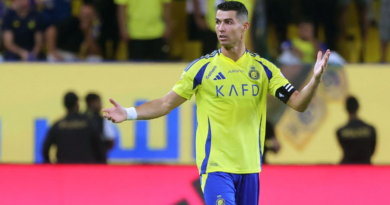Mikaela Shiffrin is now the greatest alpine skier of all time
Three years ago, Mikaela Shiffrin didn’t know if she would race again. On Saturday in Are, Sweden, she won her 87th World Cup race and became the most successful alpine skier in history, eclipsing the 34-year-old record held by Swedish legend Ingemar Stenmark. Just 27, Shiffrin “reset” Stenmark’s record — a term she prefers over “broke” — in 1,170 fewer days than it took the now 66-year-old to reach his 86th World Cup win in 1989.
That Shiffrin reset Stenmark’s record in Sweden, his home country, was an act not only of athleticism, but of symmetry. Shiffrin won her first World Cup race, also a slalom, in Are, as a 17-year-old in 2012.
“I’ve experienced everything here. My experiences in Are have been tumultuous and completely vibrant,” Shiffrin said Friday after the first of two wins there. “I won my first World Cup race here, had my first major injury here, had great races and tough races. This is the first place I was going to come back to ski racing after my dad died. For this to happen here, it feels somehow like that karma sway has been involved.”
There was a time when everyone in Shiffrin’s camp believed this day would come.
They talked about the possibility when she was a student at Vermont’s Burke Mountain Academy, practicing technical drills on rest days while her teammates were off riding pow. And when she won her first World Cup race at 17 and her first overall title just four years later.
4:18
Is Mikaela Shiffrin now the greatest skier of all time?
Alyssa Roenigk puts into perspective the magnitude of Mikaela Shiffrin surpassing Ingemar Stenmark’s World Cup record.
After she earned her second Olympic gold medal in Pyeongchang in 2018, she went on an unprecedented streak, winning three straight World Cup overall titles and 17 races in 2019 alone. “I never thought she would lose [the overall] again,” Shiffrin’s longtime coach, Mike Day, told ESPN last year.
There was a time when no one believed this day would come.
After Shiffrin’s father, Jeff, died unexpectedly in February 2020, she didn’t know if she could find the strength to ski again without his support. When she returned to the World Cup circuit a month later, the world shut down before she could give racing a try. “In the past couple years, I didn’t know if she would win one [an overall title] again,” Day said.
After months of isolation, a persistent back injury, a tough bout with COVID-19 and her shocking performance in Beijing last February, even the staunchest Shiffrin fans couldn’t see a world in which, within a year of “those” Olympics, she would win two more overall titles, eclipse Lindsey Vonn as the winningest woman in alpine skiing and break Stenmark’s long-standing record.
But since uncharacteristically skiing out of bounds three times in Beijing, Shiffrin has been remarkable. Just three weeks later, she won the third downhill race of her career, in Courchevel, France, to secure the 2022 overall World Cup title, her fourth. In the first half of the 2022-23 season, she won six races in a row in three disciplines. In February, she earned four medals at World Championships, including her first gold in giant slalom. One month later, she locked up her fifth overall World Cup title, eclipsing Vonn for the second-most overall titles in history. She is the only skier, man or woman, to win at least one race in all six World Cup disciplines and owns an unbelievable 14 World Championship medals, seven of them gold, in 17 starts. In a sport where the word “consistency” is rarely spoken, Shiffrin has made it her standard.
And it’s not just that Shiffrin is now, by the numbers, the greatest alpine skier in history. It’s how she’s done it: quickly, by being as complete a skier as the sport has seen, dominating her competition and doing it all with a generous, open-hearted charm.
“I think what’s allowed Mikaela to do this is the pureness of her desire to not only be the best in the world but be the best version of herself every time she goes out,” says Paul Kristofic, head alpine coach for U.S. Ski & Snowboard. “She is determined, studious and reflective in a way that everything she does on or off the hill is about holding herself accountable. She is an incredible student of the sport and extremely coachable. She is obsessed with perfect skiing and that’s what she’s trying to do every time she goes out.”
Certainly, there are more races and more opportunities to stack W’s today than in Stenmark’s time. It is also more common for athletes to cross the technical-speed divide. “Forty years ago, they were very different disciplines,” Kristofic says. Stenmark was a technical specialist. His 86 wins all came in slalom (40) and GS (46). Today, the downhill and super G courses (the speed events) are so much more technical that they almost require a skier with the skill set to win a GS or slalom. Just look at Vonn. One of the greatest all-time downhill skiers, she also won in those events.
But with more races comes greater potential for injury, fatigue and burnout. Shiffrin’s ability to stay healthy and motivated despite her demanding schedule has been one of her greatest assets.
“It’s not just the racing season that’s grueling, but the year-round preparation to compete in multiple disciplines,” Kristofic says. “It’s an everyday proposition for a racer like Mikaela. But her technical proficiency lowers her risk of injury. She doesn’t get herself into hot water when she’s pushing in training and trying to find the technical and tactical limits or the limits of her equipment. In races, she rarely gets into situations where she needs to make a massive recovery and risk injury.”
Shiffrin repeatedly says she doesn’t focus on records. She says anyone in her position would understand what she means. “If I was standing in the start thinking about winning my 80th race,” she said after achieving that milestone in Semmering, Austria, “I would not have won. I was thinking about the course ahead and the skiing I wanted to do and that I’m going to have to be smart and I’m going to have to be tough and I’m going to have to be patient.”
Shiffrin didn’t become the greatest ever by focusing on Vonn’s record, or Stenmark’s. Those were arbitrary goals set by someone else’s skiing. She didn’t want her 87th win to feel any more important than her 70th or her fifth — or her 100th one day. Every win is an achievement.
Shiffrin has become the greatest ever by focusing on the same things she obsessed over as an eighth grader at Burke: her technique, her pursuit of the perfect turn and the course in front of her. Each year, including this one, she sets her sights not on wins, but on consistency, on winning the overall, GS and slalom globes — all of which she already locked up this season.
The same is true of her team. “The records are amazing, and quite humbling, but I can speak for everybody in the group when I say it’s not the driving force behind what we do every day,” Kristofic says. “The work is quite consuming to prepare an athlete of Mikaela’s caliber to win a race.”
Besides, Shiffrin has plenty of people in her orbit — friends, family, the media (us!) — to focus on stats and records for her. Take Brayton “Bug” Pech, her best friend and high school roommate. Several years ago, Pech began documenting Shiffrin’s performances in Excel to keep up with her friend’s career and to settle debates with her uncle, a ski racing fanatic who lives in Prague. “We’d hear that Mikaela was the youngest to do something or was on pace to do something else, but it never went deeper,” Pech says. “I started digging into win rate, time differential and trying to answer the question, ‘What’s the limit to this sport?'”
Pech shared her spreadsheets with ESPN — after she triple fact-checked her data — and we culled them to help create the chart below on dominance, something that would generate a giant eye-roll from the world’s greatest alpine skier. “I’ve never talked to Mikaela about these spreadsheets,” Pech says, and laughs. “I don’t know if she knows I’ve done this, but I couldn’t find this information anywhere else.”
Pech, a former Boston College ski racer, says of all of Shiffrin’s mind-bending stats, a few numbers stand out. There’s her ability to jump out to a lead after her first run in her best events, slalom and GS, and hold onto it, doing so in 40 of her 53 slalom wins. That means that 78% of the time, including Saturday, she’d already won with her first run.
Then there’s her average points per finish. In World Cup races, the winner is awarded 100 points, second gets 80 and third receives 60. In 246 starts, Shiffrin has averaged 60.9 points, or better than third place, per race, across disciplines, according to Pech. “I know everybody focuses on her win-to-start ratio, which is incredible at more than 35%,” she says. “But her win-to-podium ratio is even cooler because of her consistency in not just getting on the podium, but when she gets there, in being number one.”
What charts and graphs and even best-friend spreadsheets don’t convey, however, is how unpredictable ski racing is and how many variables an athlete must overcome to win one World Cup race, let alone 87 across six disciplines by age 27. There’s the weather. The snow conditions. How the courses break down during a race. Start order. Equipment. Luck. Shiffrin has been so consistent that this day felt inevitable. But it was never a given. Thinking of it that way minimizes a truly remarkable milestone.
“It’s like going from the 100 meters to the 5,000 and 10,000 meters as a runner and winning all of them,” says Kilian Albrecht, Shiffrin’s longtime agent and a former Olympic ski racer. “But so much harder. What she’s done is crazy. And it’s so hard to explain to people who don’t know the sport.”
Those who understand how historic Shiffrin’s season is have gone out of their way to experience it in person. Pech flew from her home in Connecticut to Prague to catch her friend’s races in Špindlerův Mlýn. Shiffrin’s brother, Taylor, and his wife surprised her in Are on Saturday. Fans have been lining the courses during Shiffrin’s training sessions. They wait at the bottom for autographs and selfies, follow her through the streets. In January, an 82-year-old woman drove six hours from her home in Cortina, Italy, to Zagreb, Croatia, to watch Shiffrin race in the slalom. “She wanted to witness history,” Albrecht says.
No one knows when Shiffrin will ski her last race or notch her final World Cup win, so from here on out, every win is historic. Shiffrin says she might ski another four years. Stenmark has said he believes she will win 100 races or more. Now that she has achieved 87 wins, Shiffrin hopes there will be less talk of records. That might be the case for a while. Until one day, when another young skier starts chasing down Shiffrin.
ESPN editor Sachin Dave Chandan contributed to this report. Additional statistics from FIS and Ski-DB.




